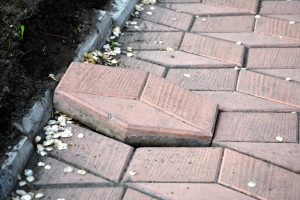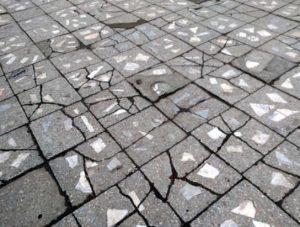By Stephen Anderson. Last Updated 19th April 2024. If you’re looking into suing the council for uneven pavement that has caused you to be injured, you may have questions that this guide can help answer. Such questions include, “how do I make a claim for pavement tripping?” and “on what grounds can you sue the council?”. This guide will explain the necessary steps for making a claim and confirm the types of evidence you could provide to support a claim.
Our advisors are available 24/7 and offer free legal advice so, if you have any queries about making a personal injury claim, you can contact us at any time that works for you. They can also put you through to a No Win No Fee personal injury solicitor from our panel who can help build your case.
Please remember that you’re under no obligation to use our services should you contact us. To find out if you’re eligible, contact us using the details below.
- Call us using 0800 408 7825
- Contact us through our website.
- Please write to us using the Live Chat window on your screen
Please read on to learn more about claiming against the council for a public slip, trip or fall caused by uneven pavement.
Select A Section
- Suing The Council For Uneven Pavement Accidents
- Council Responsibility For Pavements
- How To Sue The Council For Negligence – What Evidence Do I Need To Prove My Claim?
- Valuing Council Compensation Payouts
- Suing The Council For An Uneven Pavement Accident With A No Win No Fee Solicitor
- Learn More About Council And Local Authority Injury Claims
Suing The Council For Uneven Pavement Accidents
You may be able to sue the council for an accident caused by an uneven pavement if it occurred because they breached their duty of care to you. All parties in control of public spaces owe a duty of care to those who use the space for the intended purpose. In Wales and England, this duty of care is detailed in the Occupiers’ Liability Act 1957.
You can claim compensation for a wide range of injuries, from relatively minor ones like cuts and lacerations to more severe and potentially life-changing injuries like brain damage. There are three basic principles you need to prove to claim compensation for an injury. They are:
- That the third party had a duty of care
- That their actions breached this duty of care
- Finally, that these actions led to your injury
It’s important to note that, while there is no legal restriction for a trip hazard in the UK. However, a council will usually not consider public liability claims for a trip hazard that is less than 1 inch.
To learn more about this, please refer to our advisors, who offer free legal advice 24/7. They can be contacted using the details above.
Council Responsibility For Pavements
You might be wondering whether the council has a responsibility for the pavements in your area. Generally, councils are the local authority responsible for making sure that pavements are safe to walk on, so if you come across unsafe paving, you can report it to them. They then have a responsibility to fix the issue in an adequate time frame. If they fail to do so, and you are injured as a result, then you may be able to make a claim.
When suing the council for negligence, you have to be able to prove either that this local authority was aware of the fault in the pavement and failed to act, or that they should have been aware of it anyway. For example, this could be that a necessary inspection was not carried out, or was not carried out adequately.
To learn more about how to sue the council for an accident involving uneven pavement, contact our team of helpful advisors today.
Where Do I Report Uneven, Broken And Damaged Pavements?
If you notice a broken or uneven pavement in a public place, you may want to report this to your local authority. By doing so, you give them an opportunity to repair the
You can report it online using the Government’s online portal. There is a checker tool that involves inputting the postcode of the relevant area. Once your council has been located using the tool, you can inform them of the defective area.
Tripping on an uneven paving stone could cause you to sustain a serious injury, such as a head injury, back injury or broken forearm, that you may be able to claim for.
What If The Council Aren’t Responsible?
Most public pavements and footpaths are the responsibility of the local council or authority. However, in some cases, the pavement might be owned by a local business, such as a supermarket. In either case, if you can prove that another party was to blame, you still may be able to claim.
Contact our team of advisors today to find out if you could be entitled to claim compensation.
How To Sue The Council For Negligence – What Evidence Do I Need To Prove My Claim?
When suing a council for an uneven pavement accident, you should gather as much evidence as you can that confirms your injuries and the cause of them. Examples of evidence that could support a pavement trip claim could include:
- Medical records that confirm your injuries and the medical treatment for them.
- Any video footage that shows your accident, such as CCTV footage.
- Photos of the accident scene and your injuries.
- Contact details of any witnesses who can provide a statement.
If you are being supported by a personal injury solicitor, then they can assist you with gathering evidence for your case. For example, a solicitor may be able to take statements from witnesses, and they may arrange for you to undergo an independent medical assessment. This would result in a report illustrating the extent of your injuries which can help when determining how much compensation you are entitled to.
For more advice on how to sue the council for a pavement accident on a footpath, please contact our team for free today.
Suing Your Council – Time Limits
When suing the council for an uneven pavement that caused you to suffer injuries, it’s important to start proceedings within the time limit. For personal injury claims, this is generally three years from the date of your accident, as outlined by the Limitation Act 1980.
However, if you are injured while under the age of eighteen, you cannot make a claim for yourself. Instead, a court-appointed litigation friend can make your claim for you at any point up until your eighteenth birthday. From this point on, if no claim has been made, you can make your own claim before you turn twenty-one.
The time limit doesn’t apply to those who lack the mental capacity to make their own claim. In these cases, a litigation friend can claim on their behalf at any time. If they recover the needed capacity and no claim has been made, then the time limit will begin on the date of their recovery.
To learn more about time limits and how they could affect your personal injury claim, contact our team of advisors today.
Valuing Council Compensation Payouts
You may be wondering, “what is the average payout for a slip and fall in the UK?”. Whether you’re suing the council for an uneven pavement accident or claiming compensation for another type of accident, one of the things that will be considered is the extent of the injury and how it has negatively impacted you.
Therefore, there are two potential heads of claim. Firstly, general damages relate to the physical and psychological pain and suffering caused by the injury, as well as loss of amenity.
When this head of claim is valued, those involved in your claim might refer to the Judicial College Guidelines (JCG). This document can help with general damages, as it provides guideline compensation brackets listed beside common injuries in varying severities.
Take note that the first entry in the table below is an estimated figure that is not taken from the Judicial College Guidelines.
| Injury Type | Severity | Amount |
|---|---|---|
| Multiple serious injuries plus special damages | Serious | Up to £500,000+ |
| Back | Severe (i) | £91,090 to £160,980 |
| Back | Moderate (ii) | £12,510 to £27,760 |
| Foot | Severe | £41,970 to £70,030 |
| Foot | Moderate | £13,740 to £24,990 |
| Ankle | Very Severe | £50,060 to £69,700 |
| Ankle | Severe | £31,310 to £50,060 |
| Ankle | Modest | Up to £13,740 |
| Achilles tendon | Moderate | £12,590 to £21,070 |
| Toe | Severe | £13,740 to £21,070 |
What Else Can You Claim When Suing The Council For Negligence?
As well as general damages, when you are suing the council for uneven pavement that caused you to become injured, your settlement could also include special damages. Special damages aim to compensate you for the financial losses you have suffered due to your injury.
Some of the things you could claim compensation under special damages when suing the council for negligence include:
- A loss of earnings, both past and future, if you needed to take time off work.
- Travel expenses.
- Medical costs, such as paying for prescriptions or physiotherapy.
- Any home adaptions you needed to cope with your injury.
- Any mobility aids you required to cope with your injury.
You will need to provide evidence of these financial losses in order to claim them back under special damages. Evidence could include payslips, receipts, bank statements, and invoices.
Contact our advisors today if you still have any questions about how to sue the council for negligence or how much compensation you may receive.
Suing The Council For An Uneven Pavement Accident With A No Win No Fee Solicitor
Our panel of solicitors have years of experience handling various types of public liability claims and council negligence cases. One of them may offer to help you with your claim by working with you on a No Win No Fee basis with a Conditional Fee Agreement (CFA), which is a type of No Win No Fee agreement.
When a solicitor offers their services on a No Win No Fee basis, they won’t charge you anything upfront or ask you to pay ongoing fees for their services. Plus, if the claim fails, then you won’t pay them a fee for their work.
A solicitor can help you in a number of ways. For example, they could arrange for you to undergo an independent medical assessment, which can help you prove your claim by producing a medical report detailing your injuries. They can also talk to witnesses, help you negotiate a settlement, and explain complex legal jargon.
Contact Our Team
To learn more about claiming with No Win No Fee solicitors for council negligence claims, you can contact our advisors. They could offer you free advice for your potential compensation claim and may connect you with a solicitor from our panel. Our advisors are available 24 hours per day, 7 days per week, to help you.
To talk to an advisor:
- Call 0800 408 7825
- Contact us online.
- Use our live chat.
Learn More About Council And Local Authority Injury Claims
You can check out the resources below to learn more about claiming against local authorities or other types of personal injury claims:
- The Compensation Recovery Unit (CRU) retrieve benefit payments from claimants in Great Britain once their compensation claim has been successful.
- Please refer to this NHS web page if you’ve suffered a broken ankle and would like medical guidance.
- Would you like to know more about how to make a general complaint against your local council? If so, please refer to this Government webpage.
- To know more about claiming from public highway accidents, please read this page on our website.
- You may be able to claim if you’ve been injured from a road defect. Read this guide to learn more.
- Would you like to know more about claiming for an accident in a public school? If so, read this article on our website.
If you’d like to know more about suing the council for uneven pavement, please contact our advisors for free legal advice using the details above.
Article by AU
Edited by ET



